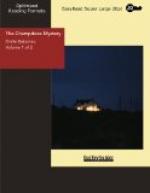“I don’t know that I might not do something of the kind,” returned Norbert.
“What did you say?” answered his wily companion.
“I said that if I were my own master, I would live as other young men.”
The lad paused abruptly, and Daumon’s eyes gleamed with joy.
“Aha,” murmured he to himself; “I have the game in my own hands. I will teach his Grace to interfere with me.”
Then, in a voice which could reach Norbert’s ears, he continued,—
“Of course some parents are far too strict.”
An impatient gesture from Norbert showed him that he had wounded him deeply.
“Yes, yes,” put in the wily Counsellor, “as the head grows bald, and the blood begins to stagnate, they forget,—they forget the days when all was so different. They forget the time when they were young, and when they sowed their wild oats with so lavish a hand. When your father was twenty-five, he was precious wild. Ask your father, if you do not believe me.”
At this moment the wagon passed the cross road, and Norbert pulled up.
“I cannot thank you enough, Marquis,” said the Counsellor as he alighted with difficulty; “but if you would condescend to come and taste my brandy, I would esteem it a great honor.”
Norbert hesitated for an instant: his reasoning powers urged him to decline the offer, but he refused to listen to them, and, fastening his horses to a tree, he followed Daumon down the by-road. The cottage was an excellent one, and extremely well furnished. A woman, who acted as Daumon’s housekeeper, served the refreshments. The office—for he called his room an office, just as if he was a professional man—was a strange-looking place. On one side was a desk covered with account books, and against the wall were sacks of seed. A number of books on legal matters crowded the shelves, and from the ceiling hung a quantity of dried herbs. The Counsellor welcomed the heir to the dukedom of Champdoce with the greatest deference, seated him in his own capacious leathern arm-chair, and pressed the brandy which he had refused upon him.
“I got this brandy from a man down Arcachon way in return for a kindness that I did him; for, without boasting, I may say that I have done kindnesses for many people in my time.” He raised his glass to his lips as he spoke. “It is good, is it not?” said he. “You can’t get stuff with an aroma like that hereabouts.”
The extreme deference of the man, coupled with the excellence of the spirit, opened Norbert’s heart in a very short space of time. Up to the present the conduct of poor Norbert had been blameless, but now, without knowing anything of the Counsellor’s character or reputation, he poured out all the secret sorrows of his heart, while Daumon chuckled secretly, preserving all the time the imperturbable face of a physician called in to visit a patient.
“Dear me! dear me!” said he; “this is really too bad. Poor fellow! I really pity you. Were it not for the deep respect that I have for the Duke, your father, I should feel inclined to say that he was not quite in his right senses.”




